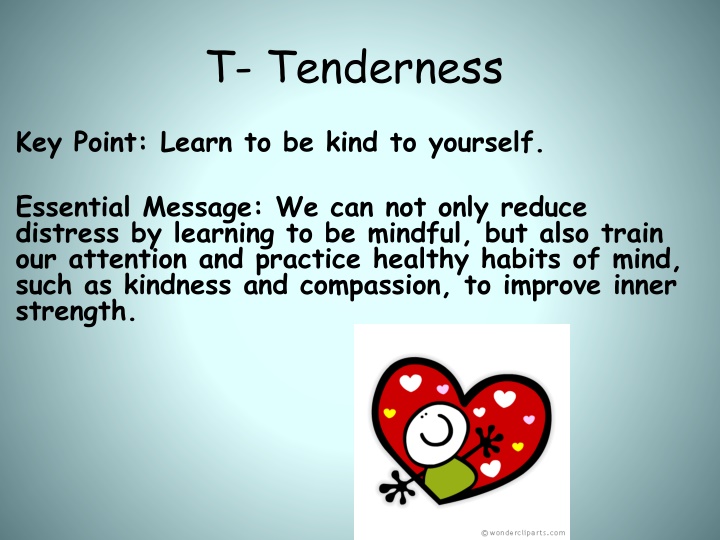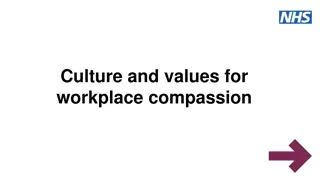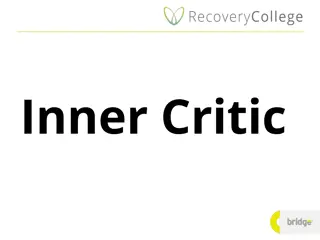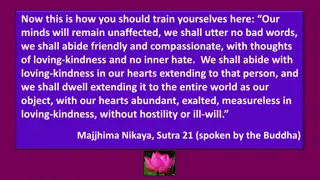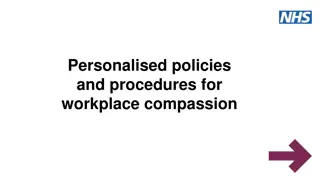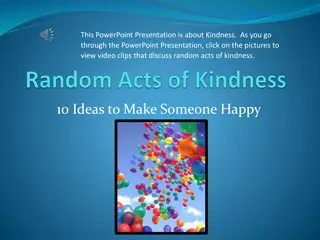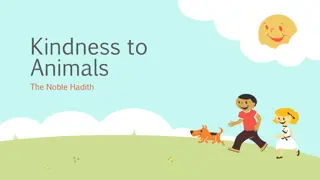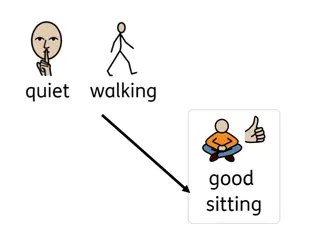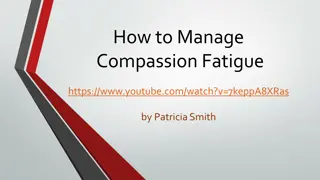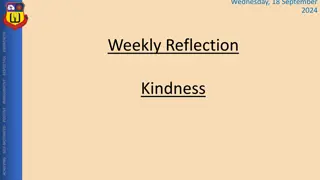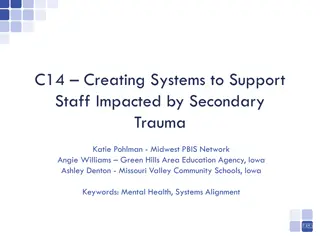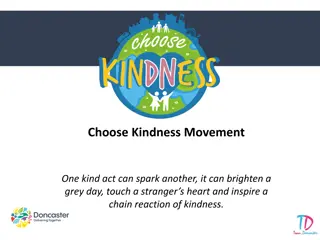Learning Kindness and Compassion for Inner Strength
When stressed, we often practice unhelpful mental habits. Recognizing and replacing meanness with kindness can improve our well-being. Scientific studies support the brain's ability to change through mindfulness practices, enhancing balance and compassion towards oneself and others. Practicing tenderness involves relaxing and acting with good intentions, reducing self-judgment and fostering compassion.
Download Presentation

Please find below an Image/Link to download the presentation.
The content on the website is provided AS IS for your information and personal use only. It may not be sold, licensed, or shared on other websites without obtaining consent from the author.If you encounter any issues during the download, it is possible that the publisher has removed the file from their server.
You are allowed to download the files provided on this website for personal or commercial use, subject to the condition that they are used lawfully. All files are the property of their respective owners.
The content on the website is provided AS IS for your information and personal use only. It may not be sold, licensed, or shared on other websites without obtaining consent from the author.
E N D
Presentation Transcript
T- Tenderness Key Point: Learn to be kind to yourself. Essential Message: We can not only reduce distress by learning to be mindful, but also train our attention and practice healthy habits of mind, such as kindness and compassion, to improve inner strength.
Stress is a part of life. We dont always get what we want, and we must do things that we don t want to do. All of this can lead us to feel stressed out . When we are stressed out for too long, we lose some of our balance and personal power, and we can get sick (chronic stress). Some of the things that stress us come from within ourselves. Our body s stress response is triggered by our thoughts as well as actual events.
When we are not aware of this, we are practicing mental habits that work against our best interests. Sometimes these habits of mind include being very judgmental of ourselves, our experiences, and other people. Activity: Read this brief excerpt from a book that describes how we often practice unhelpful mental habits. The author calls this practicing meanness to ourselves. (p.87) Since kindness can be practiced, it is important to understand that its opposite attitude, meanness, can also be practiced. In fact, meanness is practiced quite a lot. Most often, we aim it at ourselves. We usually don t fully recognize how mean we are to ourselves. This meanness is a habit of thinking and feeling that arises and is felt deeply in the body. Brantley, 2003.
Activity: Complete the following. Some examples of practicing meanness to yourself are: Behaviors: Feelings: Thoughts: Some examples of practicing kindness to yourself are: Behaviors: Feelings: Thoughts:
Scientific studies show that its possible to change the brain through mental training like the mindfulness practices learned so far. We ve learned how to bring ourselves back to feeling more balanced when we re stressed by letting go of thoughts and feelings that are not helpful & breathe. Practice making our minds healthier and more compassionate towards ourselves and others.
Practicing tenderness does not mean letting ourselves get away with things, being lazy, or slacking off. Instead, it reminds us to relax and use basic good intentions as the foundation for our actions. It reduces the tendency to perceive ourselves judgmentally and unrealistically, which can undermine our capacity to be compassionate to ourselves and others.
Throughout all of these lessons, we have been focusing on thoughts, emotions, and feelings in the body without judgment. In this activity, we will be practicing a way to strengthen these healthy habits of thinking and feeling. We will be learning a way to more compassionate toward ourselves and less judgmental. We will practice kindness instead of meanness. This is a skill that can be trained. Don t be upset if this seems awkward at first, because we re not used to doing this. However, if we start whenever we feel comfortable and give it a try, we will get better and better with time. In the long run, this can become a comfortable habit. This practice includes short statements that you practice saying to yourself. If at any time, you wish to change the words to suit yourself better, go ahead and do so.
Sometimes it feels easier to offer kindness to others instead of to ourselves, but here we start with ourselves and then move outward to others. Try the following guided meditation: Loving Kindness Meditation to Develop Mindfulness and Compassion https://www.youtube.com/watch?v=-d_AA9H4z9U Loving-Kindness practice involves the use of phrases and images to evoke and cultivate friendliness toward yourself and others. It begins by evoking a time when you felt truly loved by someone. Hold the image of the scene in mind, pay attention to the details of the scene, and allow it to evoke the felt sense of being loved and treated with kindness.
The idea is to practice directing feelings of love, kindness, and acceptance toward yourself in whatever way feels right to you. This is an antidote to practicing meanness. An antidote is a remedy that counteracts the effects of something harmful. As the practice progresses, you may wish to repeat one phrase or repeat them all inwardly over and over. The next step is to extend loving-kindness to a loved one. The practice leads, eventually, to directing loving- kindness to all people, even those who may have caused you difficulty in your life. This can take a lot of practice
